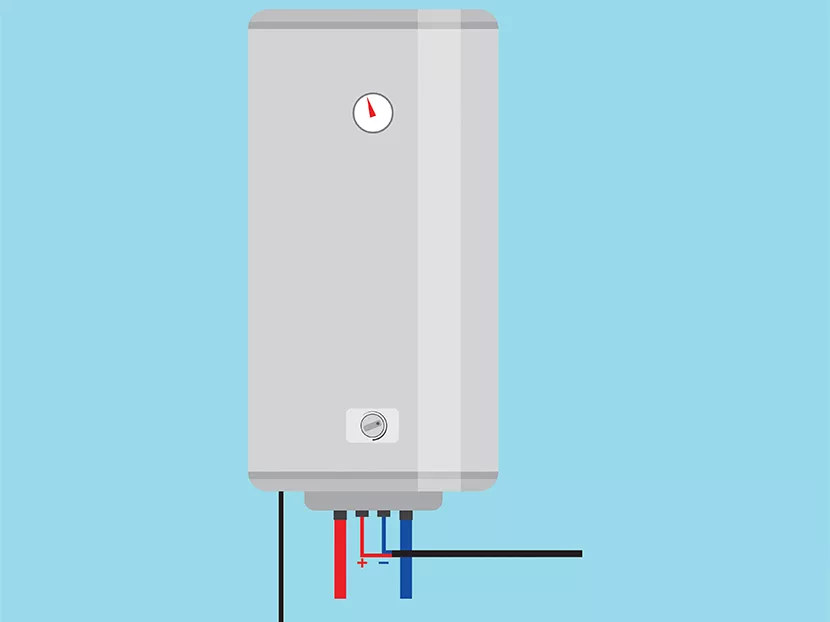When it comes to commercial water heating, there’s no one-size-fits-all solution. And with a growing number of water-heating technologies, today’s specifying engineers are faced with more options than ever to create custom water heating solutions for their clients.
Tankless technology, originally developed for residential uses, is growing in popularity in commercial applications. But can tankless technology dethrone the proven success of the tank-type commercial water heater? There are some items you should consider before making that decision.
Your first consideration is whether to use gas or electric power. If the hot water system is intended to serve an entire building, you can essentially rule out electric tankless systems, which are generally designed for point-of-use applications such as handwashing.
For commercial installations using gas, it may take multiple tankless units to accommodate peak demand that just one or two high-efficiency tank units can handle. The upside to using more than one is that it offers built-in redundancy. In a multiple unit situation, if one unit should happen to fail, the business can continue to operate until a service tech can address the issue. The failure of a unit in a solo installation could shut down the business until it’s repaired.
However, if the application calls for multiple tankless units, additional consideration should be given to gas line sizing to the equipment area as multiple tankless units will typically require considerably more Btu than tank units.
Another initial consideration is available space. If your building’s mechanical room doesn’t have enough space to accommodate the footprint of a tank water heater, installing multiple tankless units is an option.
Whatever your choice, ample service clearance is needed to make installation, proper venting and maintenance easy.
If the need for hot water is only intermittent or seasonal — such as in fast-food restaurants or schools — an on-demand tankless system might be the better choice.
Local water quality
Most contractors are quite familiar with their local water conditions but, if not, it’s easy and important to find out. About 85 percent of the communities in the U.S. have hard water, which means the local water supply has more than 12 grains of dissolved calcium, magnesium and manganese in each gallon. If a commercial customer, whose business demands a high-volume of hot water, is considering a tankless product, it’s important they know that heat exchangers in tankless units are more sensitive to water quality than tank models and, therefore, require more routine maintenance.
Most water-heater manufacturers have warranty exclusions for failures due to hard water and other water-quality parameters. For instance, if the total dissolved solids level in local water is higher than 400 uS/cm, the copper heat exchanger in the tankless water heater may experience corrosion problems that aren’t covered by warranty. Damage caused by other contaminants, such as aluminum, copper, chloride, iron and zinc, also may not be covered under warranty. Contractors should educate themselves about the characteristics of the water supply in their service area to avoid a warranty issue for their clients.
One popular misconception is that using a water softener eliminates all water-quality problems. But water softeners have no impact on several key water characteristics, such as TDS, where high levels can lead to significant corrosion and maintenance issues with tankless-type water heaters.
Some tank products are designed to minimize the negative impact of various water-quality conditions.
Maintenance capabilities, budget
Most business owners can’t maintain a commercial water-heating system by themselves, so the cost of maintenance is an important consideration. The majority of businesses want a “set it and forget it” system that runs for years without problems.
Because commercial tankless units typically require descaling at least once, or twice a year, they cost more to maintain than tank models. Commercial high-efficiency tank water heaters require no routine descaling and only an occasional visual inspection of the venting connections. No service call required.
Tankless descaling costs about $250 per installed unit, which means that a business may have to spend $1,000+ in annual maintenance depending on the local water condition and number of units.
Efficiency expectations
By design, tank-type units perform well in situations where there’s a big draw. The tank provides a reserve of hot water to make sure the unit never falls behind.
An on-demand tankless unit often cycles with very low draws. Every time there’s a cycle on the igniter, it activates a mechanical component. In contrast, one handwashing isn’t enough to make a tank unit fire.
In independent testing, brand-new tank water heaters usually deliver thermal efficiency that’s about two percentage points higher than what tankless units deliver. Due to heavy scale buildup, the efficiency of tankless water heaters decreases faster than tank models, especially tank units with top-fired heat exchangers and no direct heat transfer at the tank bottom.
Many building owners may feel that tankless is a good choice for their businesses simply because tankless is making inroads in the residential market. Contractors can help influence the final decision by educating business owners about the pros and cons of each type and help each business get the best possible fit for the way it operates and uses hot water — one that delivers ample supply at a lower cost over the life of the system.







